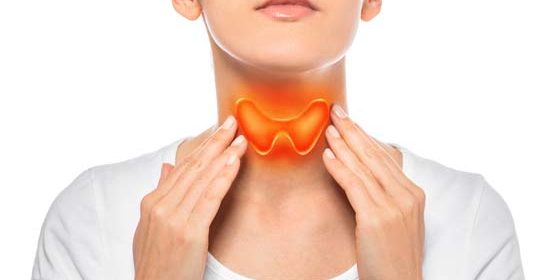Men and women don’t realize that good thyroid function is necessary for fertility and the ability to conceive and maintain a pregnancy. A low or hyper-functioning thyroid gland can prevent you from achieving that much-desired pregnancy. While there are many and varied reasons for infertility, suboptimal thyroid function may be that “missing link,” especially for those with no specific reproductive problems.
A complete thyroid evaluation is essential and should be done as soon as possible for any woman who wants to get pregnant, especially if she has any of the following:
Early warning signs of Thyroid problem:
- Trying unsuccessfully to get pregnant for more than six months
- Two or more miscarriages
- Irregular menstrual cycle
- Period pain
- Family history of thyroid problems.
- Generally, for males and females, any of the following signs or symptoms may also suggest the need for thyroid evaluation.
- Low libido
- Erectile dysfunction
- Lethargy & fatigue
- Susceptibility to the cold/cold hands & feet
- Inability to lose weight or gain weight
- Changes in the texture of skin, nails, hair, hair loss
- Recurrent infections
- Constipation
What Does the Thyroid Gland Do?
The thyroid gland is located near the front of the throat, below the voice box, and above the collar bones. Every cell in the body depends upon thyroid hormones to regulate the body’s metabolism, blood calcium levels, energy production, fat metabolism, and oxygen utilization. It is also responsible for the balance of other hormones & weight maintenance. If the Pituitary gland is the Headmaster of all endocrine glands that produce all hormones, the thyroid gland is like the deputy headteacher.
Hormones involved with thyroid function include Thyroid Releasing Hormone (TRH) released from the hypothalamus in the brain, which stimulates the pituitary gland at the base of the brain to release Thyroid Stimulating Hormone (TSH), which in turn stimulates the thyroid gland to produce Thyroxine (T4) & Triiodothyronine (T3). Much of T4 is converted to T3 (the active form) in the liver. Thyroid hormones are synthesized from iodine and the amino acid Tyrosine (from protein), and the conversion to the active state is reliant on the trace mineral Selenium.
Healthy Thyroid function can be affected by the following:
- Exposure to environmental toxins – electromagnetic radiation, chemicals, pesticides, and heavy metals like mercury, lead, arsenic, and fluoride. Environmental toxins cause several endocrine disruptions, becoming a clear danger to fertility.
- Genetic susceptibility
- High levels of stress
- Nutrient deficiencies
- Eating the wrong type of food
- Autoimmune disorders
- Infections
- Other hormone imbalances such as estrogen dominance, high prolactin levels
How Does Hypothyroidism (Low) Affect fertility? The early warning signs of
Anovulatory cycles – In this case, the person has a menstrual cycle but does not release an egg (ovulating). It makes pregnancy impossible.
Luteal Phase Problems: A person with a short second half of the menstrual cycle who gets a fertilized egg after intercourse will discover that such fertilized egg cannot implant securely and ends up leaving the body at the same time that menstruation would occur (very early miscarriage) and is often mistaken as a regular period.
High Prolactin Levels – due to elevated Thyroid Releasing Hormone (TRH) levels and low Thyroxine (T4) resulting in irregular or no ovulation.
Other Hormonal Imbalances – reduced sex hormone binding globulin (SHBG), estrogen dominance, and progesterone deficiency, all of which interfere with proper reproductive hormone balance.
Thyroid disorders can cause significant reproductive problems for women. Consequently, testing for thyroid disease should be considered for couples with fertility problems and repeated early pregnancy loss. Abnormalities in thyroid function can harm reproductive health, resulting in reduced conception rates, increased miscarriage risk, and adverse pregnancy and neonatal outcomes.
Low thyroid hormone levels in men can cause poor semen quality, low sperm count, reduced testicular function, erectile dysfunction, and decreased libido.
For over two decades, Prof Oladapo Ashiru has noticed a strong link between hypo- and hyperthyroidism, infertility, adverse pregnancy, and neonatal outcomes.
Consequently, routine screening of the general population for thyroid dysfunction at the start of pregnancy, especially when seeking fertility treatment or struggling with miscarriage, is highly recommended by experts.
Hypothyroidism (underactive thyroid) affects about 0.5 percent of women of reproductive age. In children and teens, the condition is associated with a delay in reaching sexual maturity, according to published reports.
The thyroid evaluation can be done in our laboratory at the Medical Art Center and then interpreted by our highly specialized Doctors. There is also a new technique using bioenergetic testing and a TrueRife scan at Martlife Detox clinic to determine whether the thyroid gland is stressed or weak at the preclinical state before it becomes pathological.  The image shows the location of the thyroid gland.
The image shows the location of the thyroid gland.
Finally, at MART Group, the Martlife Detox clinic provides regular whole-body detoxification, a good diet with iodide salt, and a good multivitamin supplement to protect thyroid function.






